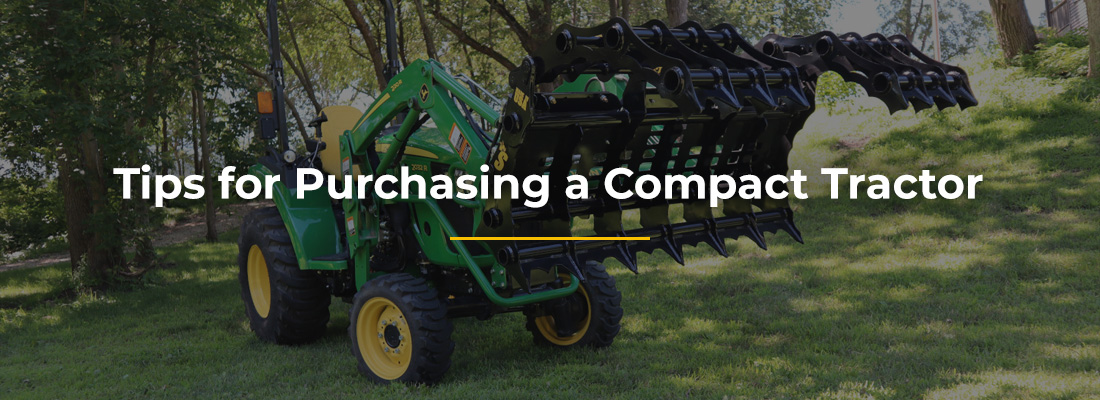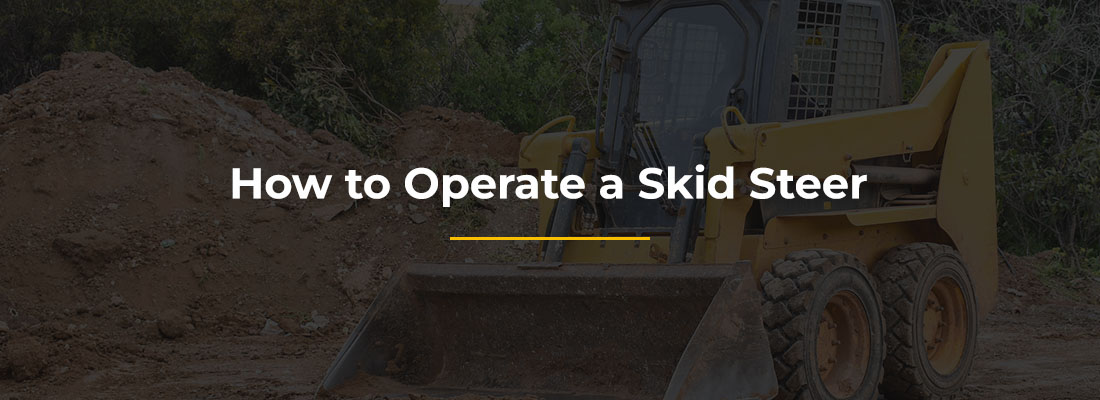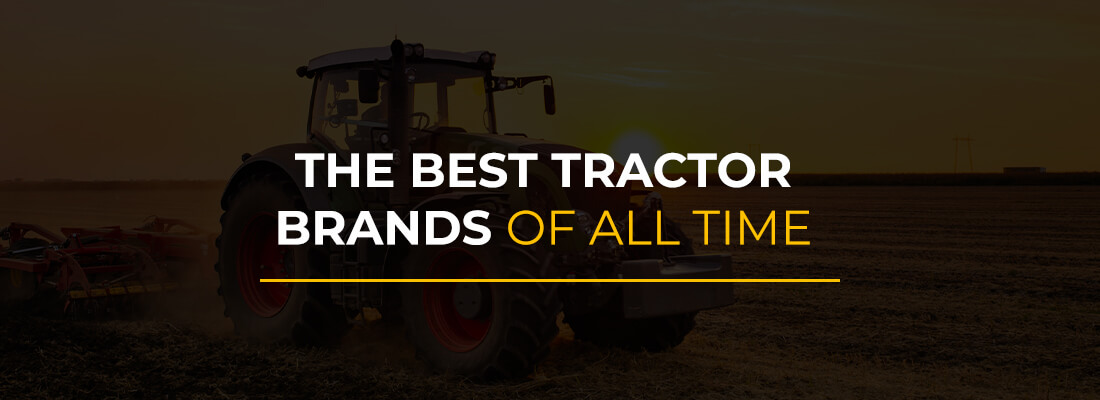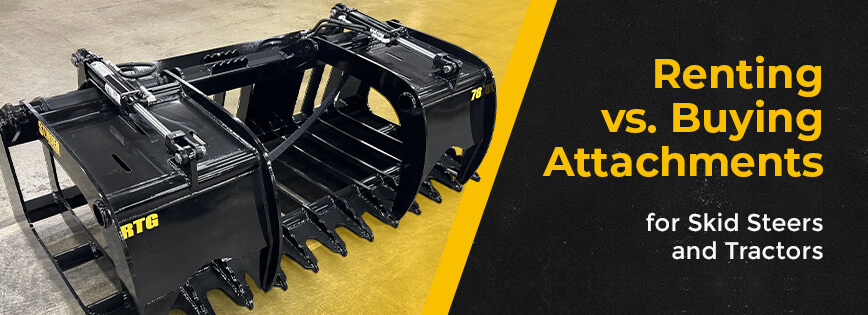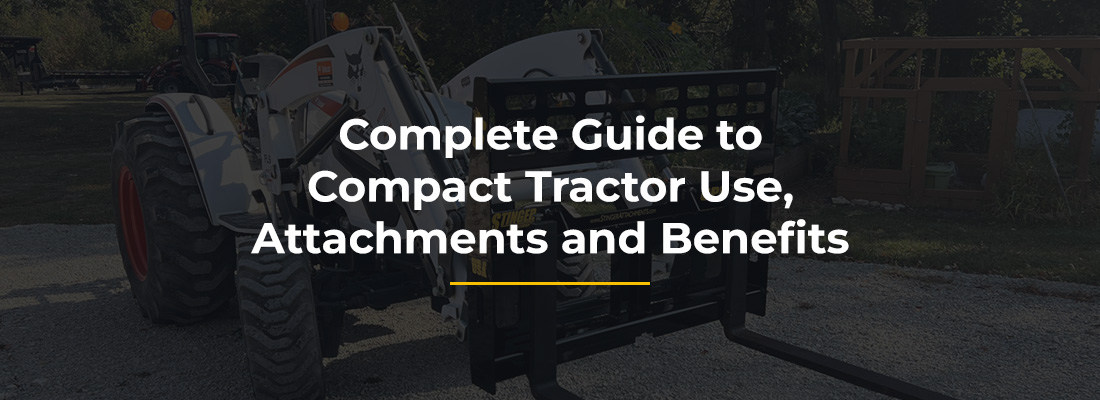Essential Equipment for Your Farm Business
To successfully run a farm, you need a variety of tools to help you stay productive and prosperous. Modern equipment gives farmers precise tools for jobs around the farm, helping them cover more ground in less time.
One of the more versatile machines that farmers can invest in is the skid steer, which can tackle virtually every farming task. This guide to essential equipment for your farm business will introduce you to the skid steer and other must-have equipment needed to start a farm and maintain it.
10 Must-Have Tools and Equipment for Farms
With so many different tasks to get done, farmers need tools designed for specialized purposes. They also need high-quality equipment so they can get a long-term return on their investment. As you start out in the farming business, you can slowly accumulate the tools and equipment you need to grow your business and turn it into a thriving enterprise.
Here is our farming equipment list of the top 10 must-have tools for farmers:
1. Pickup Truck
When you’re new to farming, you might not realize how much off-farm work you need to do. From picking up supplies and materials to hauling livestock or equipment, farmers must have a reliable, medium- to heavy-duty pickup truck. With a pickup truck, you’ll be able to head into town and pick up firewood, feed, soil, turf and other necessary supplies.
When it’s time to perform repairs, build fences or construct new farm buildings, you’ll need a way to efficiently haul building supplies. If you farm livestock, you need a truck with a hitch to haul a livestock trailer, or in a pinch, you can place small livestock in the bed of the truck with a topper.
If you take good care of your truck over the years, it can serve you as one of the most essential pieces of equipment on your farm.
2. Utility Vehicle
Farmers need ways to efficiently maneuver around the property, whether it’s to head out to mend fences, perform upkeep, collect wood or any other job the day brings. When managing a small farm, a utility vehicle can help farmers meet these needs practically. Utility vehicles are more convenient than using your pickup truck because you can easily navigate smaller spaces, and they’re more versatile than an ATV.
Equipped with a cargo box and a hitch, you can also use your utility vehicle for hauling supplies around the farm. Utility vehicles have a low center of gravity and rugged tires, making them suitable for muddy, hilly or snowy terrain. You can choose from a two-wheel or four-wheel utility vehicle, with the four-wheel option typically being the better investment if you’re dealing with uneven land.
3. Compact Tractor
For small farms, you may get by with just a utility vehicle, but larger farms may benefit from a compact tractor or both a compact tractor and a utility vehicle. Compact tractors can do a lot more heavy-duty jobs around the farm than a utility vehicle, such as hay baling or herding and feeding livestock. They also have much more horsepower, meaning they can lift and haul heavier items.
Compact tractors can also be equipped with a variety of farming attachments. With the right tools, you can manage vegetation, push snow and other material or till soil in preparation for planting. At harvest time, a tractor can be equipped with harvesting equipment. A compact tractor can also help you smooth and grade roadways and help maintain easements and right-of-ways.
4. Handcarts
When you need a compact solution for moving supplies around your farm, a handcart is the simplest and most affordable option. Handcarts are a good investment for a startup farm because they are cost-effective, low-maintenance and extremely versatile. They’re also easy to maneuver, alleviate excessive strain and mitigate repetitive motion injuries.
Handcarts have a four-wheel base, making them quite sturdy to transport heavy and awkward items. Typical uses for a handcart on small farms include:
- Moving soil, sod and heavy bags of fertilizer
- Transporting tools around the farm to perform repairs
- Cleaning up manure piles
- Hauling away weeds, leaves and other debris
Handcart models range from basic pushcarts to more complex options that convert to a trailer.
5. Miscellaneous Tools
As a farmer, you’ll need a variety of electric tools and hand tools for a range of odd jobs. The first investment to make in electric tools is an electric drill. Whether you need to nail up fence posts, hang a new barn door, install shelving or build a compost bin, an electric drill is something you won’t regret investing in. You’ll also need a saw to cut lumber for building fences, sheds, garden planters and more.
Farmers need a high-quality set of hand tools, including:
- Tape measures
- Pliers
- Screwdrivers and various bits
- Hammers
- Socket and ratchet set
- Utility knives
Farmers should also build up a collection of garden tools. From trowels, spades and forks to wheelbarrows, rakes and shovels, you’ll need the best tools for digging, weeding and planting. Don’t forget a good pair of gardening gloves, too.
6. Manure Spreader
Recycling manure into soil fertilizer is a vital habit for farmers. Manure promotes soil nutrition for a healthy farm for years to come. A manure spreader breaks up big clumps of manure with a rotating blade. As the manure is broken up, the spreader discharges and scatters it thinly and evenly over fields. Manure spreaders can dispense manure at the rear or to the side.
Manure spreaders range from compact size to tractor-driven models. Compact manure spreaders are useful on small farms. They’re lighter weight and easy to maneuver. Tractor models carry larger loads, making them more efficient for large farms.
7. Composter
A composter provides an important sustainable farming solution. It reduces waste while providing a cost-effective way to continuously feed your plants and nourish your soil. Composters range from a simple homemade wooden box to a self-contained tumbling composter. A wooden box is usually just a temporary solution because it attracts rodents and other animals, which can cause problems over time.
Tumbling composters churn and break up large clumps of waste while taking in oxygen through adjustable vents to help organic matter biodegrade. Tumbling composters come in high-capacity models, which are beneficial if you have lots of vegetation cuttings in addition to food waste. These units may also have UV- and animal-resistant features.
8. Livestock Trailer
If you’re farming animals, a livestock trailer is a necessity. It’s especially necessary if you raise large livestock like cows and horses. Owning your own livestock trailer gives you lots of freedom. Without it, you’d need to arrange to rent or borrow one every time you need it. This can be a time-consuming process and might not line up with your schedule.
Even if you don’t tend to haul livestock often, a trailer still offers plenty of versatility for other needs. A livestock trailer can be used to haul your supplies, whether it’s firewood, feed, lumber or building materials. You can also use it to transport hay bales and small farm equipment.
When choosing a livestock trailer, consider how large of a trailer you need based on the number of animals you transport. You should also consider safety and comfort as factors in which model to purchase.
9. Harvesting Equipment
For farmers raising crops rather than livestock, harvesting equipment can drastically improve your productivity. The type of harvesting equipment you need depends on the type of crop you’re farming. Farming equipment manufacturers produce crop-specific machines and attachments designed to efficiently harvest a particular type of crop.
For small farms, it may not make sense to invest in high-capacity harvesting machines designed to cover hundreds of acres. Instead, you may need small agricultural equipment for small farmers, such as compact harvesting equipment. Small harvesting equipment offers the appropriate scale for small farms while still increasing productivity. For example, mini combines can help you efficiently harvest smaller fields, whether you’re harvesting crops like wheat and rice or just forage.
10. Skid Steer Loader
An excellent long-term investment that will continue to pay off is a skid steer loader. Skid steers are known to be one of the most versatile and practical machines for construction, landscaping and farming thanks to their compatibility with a range of attachments.
Skid steers are also the perfect small farm equipment. They are rigid frame machines that expertly maneuver tight spots. They are able to turn in their own footprint, so they allow farmers to navigate around small farms with precision. They’re also speedy machines that can easily traverse uneven ground with their rugged wheels.
Skid Steer Attachments for Farmers
What makes a skid steer so desirable as small farm equipment is that it’s not just limited to its front bucket. Skid steers are compatible with a massive range of standard and specialized attachments to help you tackle every conceivable farming job. This means you don’t have to invest in multiple types of farm equipment and can get many jobs done with a single machine.
Below are a few of the must-have skid steer attachments for your farm:
1. Bale Spears
Using your property to grow hay is a good way to make the most of your land. Having a skid steer makes it easy to manage and cut hay and transport and store hay bales. Bale spears, in particular, are a useful attachment for this purpose. The bale spear attaches to the front loader and has two to four tines that pierce the bale of hay and lift it for transport.
Bale spears from Stinger Attachments come in a range of sizes and configurations, depending on the size of hay bales you manage. The Series 1 with three tines and the Series 2 with two tines are excellent options for small farms handling medium- to large-sized hay bales.
2. Buckets
Buckets are a multipurpose attachment that are a must-have for your farm’s skid steer. Buckets help you haul a range of supplies efficiently. Easily move around feed, soil, sod, fertilizer bags, firewood and more, saving time and effort.
There are a variety of types of buckets, each designed to handle different materials. A smooth-edged bucket, such as the Series 4 material bucket is ideal for scooping soil, gravel and other loose material. You can also use the smooth edge to grade and level material. The rock bucket is ideal for picking up and sifting through material to separate large rocks and debris.
3. Grapples
Grapples are a type of bucket attachment that enclose the material to secure it in place for hauling. Different grapple designs exist for handling different materials. For example, a rock grapple from Stinger Attachments allows you to pick up rock in the field and secure it in the bucket as you continue picking up more debris.
Stinger Attachments also offers a manure grapple, which is ideal for securely handling loose material better than a standard bucket. When lot clearing and preparing your farm, a stump grapple can help you rip up and remove stumps and securely transport them. It’s also a good attachment to have on hand when you have ongoing landscaping projects.
4. Land Planes
Land planes help with the tough work of land management, site preparation and ongoing field maintenance. Land plane attachments from Stinger Attachments are designed with a horizontal blade that passes over the ground, skimming the top layer and removing debris. It leaves behind a smooth finish in a single pass, improving your productivity.
In addition to site preparation and ground leveling, you can also use land planes seasonally to help condition and prepare your topsoil when you attach an optional hydraulic scarifier for tilling.
5. Pallet Forks
As your farming business grows, you’ll have more supplies and building materials to manage and organize. Pallet forks help you efficiently lift and haul palletized or bulk items so you can keep an organized barn or storage space. With a pallet fork attachment for skid steers, you get the benefit of a forklift without having to invest in an entirely separate machine. Pallet forks can serve many other purposes, from moving hay to hauling fencing to clearing away debris.
Pallet forks from Stinger Attachments are designed for safety, productivity and efficiency. With a walk-thru design, farmers can easily and safely get in and out of the machine.
6. Trenchers
A final piece of farm equipment your business can’t go without is a trencher attachment for your skid steer. Trenchers allow you to effortlessly dig smooth drainage ditches or trenches for laying irrigation lines. Equipped with a heavy-duty chain of rugged teeth, trenchers allow you to saw into hard rock or frozen ground.
Bigfoot trenchers from Stinger Attachments are built with operator efficiency in mind. With adjustable depth control, you can ensure you dig a smooth, even trench every time. Our patent-pending crumber bar design allows you to start it inside the trench, so you don’t have to get out and manually reset it each time. Our different chain options allow you to select the right tool for the type of ground conditions you operate in.
Choose Stinger Attachments for Your Skid Steer
Small farm equipment is designed to make farmers more efficient and productive and earn higher profit margins. Skid steer loaders are must-have small farm equipment, allowing farmers to get more done in less time.
Stinger Attachments is a leading manufacturer of specialty skid steer attachments for small farms. With superior quality and design, our small farm equipment attachments can continue serving your farming business for years to come. Learn more about how Stinger Attachments can help your small farm with top equipment at low prices. Contact us online today for more information.

